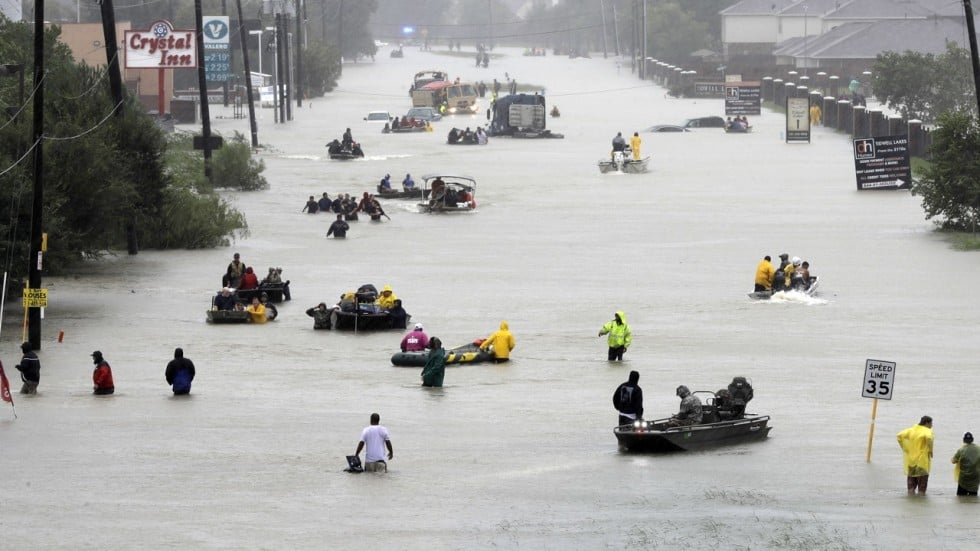Human-caused
warming likely intensified Hurricane Harvey's rains
American Geophysical
Union
 New research shows
human-induced climate change increased the amount and intensity of Hurricane
Harvey's unprecedented rainfall. The new findings are being published in two
separate studies and presented at the 2017 American Geophysical Union
Fall Meeting, along with additional new findings about recent Atlantic Ocean
hurricanes.
New research shows
human-induced climate change increased the amount and intensity of Hurricane
Harvey's unprecedented rainfall. The new findings are being published in two
separate studies and presented at the 2017 American Geophysical Union
Fall Meeting, along with additional new findings about recent Atlantic Ocean
hurricanes.
Hurricanes Harvey,
Irma and Maria battered the U.S. Gulf Coast and Caribbean earlier this year,
bringing widespread flooding and wind damage. Hurricane Harvey, a Category 4
storm at first landfall on August 25, stalled over Texas as a tropical storm,
causing record rainfall between August 26 and 28.
A new study accepted
for publication in Geophysical Research Letters (GRL), a
journal of the American Geophysical Union, finds Hurricane Harvey's seven-day
rainfall total potentially increased by at least 19 percent compared to a
similar storm in the mid-20th century.
Another study published online in the journal Environmental Research Letters (ERL) directly attributes the rainfall increase to human-caused climate change.
The ERL paper finds climate change made the record three-day rainfall that fell over Houston during Hurricane Harvey roughly three times more likely and 15 percent more intense than a similar storm in the early 1900s.
Another study published online in the journal Environmental Research Letters (ERL) directly attributes the rainfall increase to human-caused climate change.
The ERL paper finds climate change made the record three-day rainfall that fell over Houston during Hurricane Harvey roughly three times more likely and 15 percent more intense than a similar storm in the early 1900s.
The new research confirms heavy rainfall events are increasing across the Gulf Coast region because of human interference with the climate system. Climate change, caused by increasing greenhouse gases in the atmosphere from the burning of fossil fuels, is raising temperatures globally.
Warmer air can carry more moisture, which can lead to more extreme rainfall events, and warmer ocean surface temperatures are known to intensify the most powerful hurricanes.
In the GRL study,
researchers used a statistical model based on historical climate data to
separate how much of the extreme rainfall from Hurricane Harvey was due to
natural influences and how much was due to human influences.
They first estimated the chances of Harvey's precipitation total at the present day then estimated the amount of precipitation that would have fallen in an event of the same rarity using 1950s greenhouse gas levels, essentially stripping away the effects of today's higher greenhouse levels.
They first estimated the chances of Harvey's precipitation total at the present day then estimated the amount of precipitation that would have fallen in an event of the same rarity using 1950s greenhouse gas levels, essentially stripping away the effects of today's higher greenhouse levels.
The study's authors
expected about a 6 percent increase in rainfall from Hurricane Harvey because
of warming in the Gulf of Mexico. The new study finds human-induced climate
change likely increased Hurricane Harvey's unprecedented rainfall by at least
19 percent and potentially as much as 38 percent.
"It is not news
that climate change affects extreme precipitation, but our results indicate
that the amount is larger than expected," said researcher Michael Wehner
of Lawrence Berkeley National Laboratory in Berkeley, California, a co-author
of the new GRL study, who will also be presenting the new research at a press
conference at the AGU Fall Meeting today.
In the new study in
ERL, researchers examined the observed rainfall record in the Gulf Coast region
since 1880 to show that the intensity of extreme precipitation has increased
substantially. Multiple high-resolution climate models confirmed that the
increasing trend is due mainly to human-caused global warming.
Overall, the chances
of seeing a rainfall event as intense as Harvey have roughly tripled -
somewhere between 1.5 and five times more likely - since the 1900s and the
intensity of such an event has increased between 8 percent and 19 percent,
according to the new study by researchers with World Weather Attribution, an
international coalition of scientists that objectively and quantitatively
assesses the possible role of climate change in individual extreme weather
events.
Even if global targets
set by the Paris Agreement of limiting warming to 2 degrees Celsius (3.6
degrees Fahrenheit) are met, scientists estimate an event like Hurricane Harvey
will see a further increase of about a factor of three in probability.
"But, if we miss
those targets, the increase in frequency and intensity could be much
higher," said Karin van der Wiel, a postdoctoral researcher at the Royal
Netherlands Meteorological Institute (KNMI) in De Bilt, Netherlands and a
co-author of the new ERL paper.